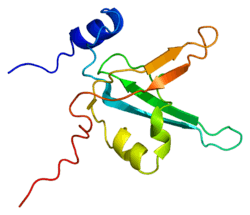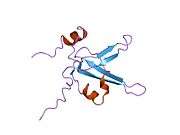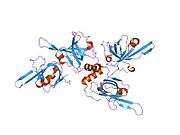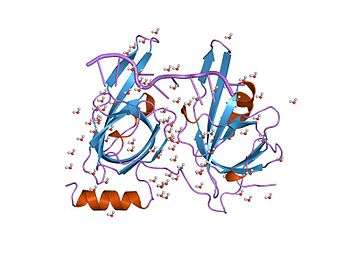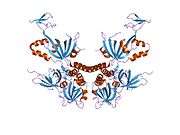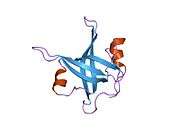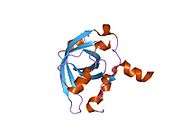Replication protein A1
| View/Edit Human | View/Edit Mouse |
Replication protein A 70 kDa DNA-binding subunit is a protein that in humans is encoded by the RPA1 gene.[3]
Interactions
Replication protein A1 has been shown to interact with:
See Also
References
- ↑ "Human PubMed Reference:".
- ↑ "Mouse PubMed Reference:".
- ↑ Umbricht CB, Erdile LF, Jabs EW, Kelly TJ (April 1993). "Cloning, overexpression, and genomic mapping of the 14-kDa subunit of human replication protein A". J Biol Chem. 268 (9): 6131–8. PMID 8454588.
- ↑ Wong JM, Ionescu D, Ingles CJ (January 2003). "Interaction between BRCA2 and replication protein A is compromised by a cancer-predisposing mutation in BRCA2". Oncogene. 22 (1): 28–33. doi:10.1038/sj.onc.1206071. PMID 12527904.
- ↑ Brosh RM, Li JL, Kenny MK, Karow JK, Cooper MP, Kureekattil RP, Hickson ID, Bohr VA (August 2000). "Replication protein A physically interacts with the Bloom's syndrome protein and stimulates its helicase activity". J. Biol. Chem. 275 (31): 23500–8. doi:10.1074/jbc.M001557200. PMID 10825162.
- ↑ Opresko PL, von Kobbe C, Laine JP, Harrigan J, Hickson ID, Bohr VA (October 2002). "Telomere-binding protein TRF2 binds to and stimulates the Werner and Bloom syndrome helicases". J. Biol. Chem. 277 (43): 41110–9. doi:10.1074/jbc.M205396200. PMID 12181313.
- ↑ Moens PB, Kolas NK, Tarsounas M, Marcon E, Cohen PE, Spyropoulos B (April 2002). "The time course and chromosomal localization of recombination-related proteins at meiosis in the mouse are compatible with models that can resolve the early DNA-DNA interactions without reciprocal recombination". J. Cell. Sci. 115 (Pt 8): 1611–22. PMID 11950880.
- 1 2 3 4 5 6 Kneissl M, Pütter V, Szalay AA, Grummt F (March 2003). "Interaction and assembly of murine pre-replicative complex proteins in yeast and mouse cells". J. Mol. Biol. 327 (1): 111–28. doi:10.1016/s0022-2836(03)00079-2. PMID 12614612.
- ↑ Parker A, Gu Y, Mahoney W, Lee SH, Singh KK, Lu AL (February 2001). "Human homolog of the MutY repair protein (hMYH) physically interacts with proteins involved in long patch DNA base excision repair". J. Biol. Chem. 276 (8): 5547–55. doi:10.1074/jbc.M008463200. PMID 11092888.
- ↑ Romanova LY, Willers H, Blagosklonny MV, Powell SN (Dec 2004). "The interaction of p53 with replication protein A mediates suppression of homologous recombination". Oncogene. 23 (56): 9025–33. doi:10.1038/sj.onc.1207982. PMID 15489903.
- ↑ Riva F, Zuco V, Vink AA, Supino R, Prosperi E (Dec 2001). "UV-induced DNA incision and proliferating cell nuclear antigen recruitment to repair sites occur independently of p53-replication protein A interaction in p53 wild type and mutant ovarian carcinoma cells". Carcinogenesis. 22 (12): 1971–8. doi:10.1093/carcin/22.12.1971. PMID 11751427.
- ↑ Shao RG, Cao CX, Zhang H, Kohn KW, Wold MS, Pommier Y (March 1999). "Replication-mediated DNA damage by camptothecin induces phosphorylation of RPA by DNA-dependent protein kinase and dissociates RPA:DNA-PK complexes". EMBO J. 18 (5): 1397–406. doi:10.1093/emboj/18.5.1397. PMC 1171229
 . PMID 10064605.
. PMID 10064605. - 1 2 Bochkareva E, Korolev S, Lees-Miller SP, Bochkarev A (April 2002). "Structure of the RPA trimerization core and its role in the multistep DNA-binding mechanism of RPA". EMBO J. 21 (7): 1855–63. doi:10.1093/emboj/21.7.1855. PMC 125950
 . PMID 11927569.
. PMID 11927569. - ↑ Bochkareva E, Frappier L, Edwards AM, Bochkarev A (February 1998). "The RPA32 subunit of human replication protein A contains a single-stranded DNA-binding domain". J. Biol. Chem. 273 (7): 3932–6. doi:10.1074/jbc.273.7.3932. PMID 9461578.
- ↑ Unsal-Kaçmaz K, Chastain PD, Qu PP, Minoo P, Cordeiro-Stone M, Sancar A, Kaufmann WK (April 2007). "The human Tim/Tipin complex coordinates an Intra-S checkpoint response to UV that slows replication fork displacement". Mol. Cell. Biol. 27 (8): 3131–42. doi:10.1128/MCB.02190-06. PMC 1899931
 . PMID 17296725.
. PMID 17296725. - ↑ Yoo E, Kim BU, Lee SY, Cho CH, Chung JH, Lee CH (August 2005). "53BP1 is associated with replication protein A and is required for RPA2 hyperphosphorylation following DNA damage". Oncogene. 24 (35): 5423–30. doi:10.1038/sj.onc.1208710. PMID 15856006.
- ↑ Li L, Lu X, Peterson CA, Legerski RJ (October 1995). "An interaction between the DNA repair factor XPA and replication protein A appears essential for nucleotide excision repair". Mol. Cell. Biol. 15 (10): 5396–402. doi:10.1128/mcb.15.10.5396. PMC 230789
 . PMID 7565690.
. PMID 7565690.
Further reading
- Iftode C, Daniely Y, Borowiec JA (1999). "Replication protein A (RPA): the eukaryotic SSB.". Crit. Rev. Biochem. Mol. Biol. 34 (3): 141–80. doi:10.1080/10409239991209255. PMID 10473346.
- Binz SK, Sheehan AM, Wold MS (2005). "Replication protein A phosphorylation and the cellular response to DNA damage.". DNA Repair (Amst.). 3 (8-9): 1015–24. doi:10.1016/j.dnarep.2004.03.028. PMID 15279788.
- Dornreiter I, Erdile LF, Gilbert IU, von Winkler D, Kelly TJ, Fanning E (1992). "Interaction of DNA polymerase alpha-primase with cellular replication protein A and SV40 T antigen.". EMBO J. 11 (2): 769–76. PMC 556510
 . PMID 1311258.
. PMID 1311258. - Erdile LF, Heyer WD, Kolodner R, Kelly TJ (1991). "Characterization of a cDNA encoding the 70-kDa single-stranded DNA-binding subunit of human replication protein A and the role of the protein in DNA replication.". J. Biol. Chem. 266 (18): 12090–8. PMID 2050703.
- Li L, Lu X, Peterson CA, Legerski RJ (1995). "An interaction between the DNA repair factor XPA and replication protein A appears essential for nucleotide excision repair.". Mol. Cell. Biol. 15 (10): 5396–402. doi:10.1128/mcb.15.10.5396. PMC 230789
 . PMID 7565690.
. PMID 7565690. - Keshav KF, Chen C, Dutta A (1995). "Rpa4, a homolog of the 34-kilodalton subunit of the replication protein A complex.". Mol. Cell. Biol. 15 (6): 3119–28. doi:10.1128/mcb.15.6.3119. PMC 230543
 . PMID 7760808.
. PMID 7760808. - Umbricht CB, Griffin CA, Hawkins AL, Grzeschik KH, O'Connell P, Leach R, Green ED, Kelly TJ (1994). "High-resolution genomic mapping of the three human replication protein A genes (RPA1, RPA2, and RPA3).". Genomics. 20 (2): 249–57. doi:10.1006/geno.1994.1161. PMID 8020972.
- Gomes XV, Wold MS (1996). "Functional domains of the 70-kilodalton subunit of human replication protein A.". Biochemistry. 35 (32): 10558–68. doi:10.1021/bi9607517. PMID 8756712.
- Bochkarev A, Pfuetzner RA, Edwards AM, Frappier L (1997). "Structure of the single-stranded-DNA-binding domain of replication protein A bound to DNA.". Nature. 385 (6612): 176–81. doi:10.1038/385176a0. PMID 8990123.
- Amacker M, Hottiger M, Mossi R, Hübscher U (1997). "HIV-1 nucleocapsid protein and replication protein A influence the strand displacement DNA synthesis of lentiviral reverse transcriptase.". AIDS. 11 (4): 534–6. PMID 9084803.
- Cujec TP, Cho H, Maldonado E, Meyer J, Reinberg D, Peterlin BM (1997). "The human immunodeficiency virus transactivator Tat interacts with the RNA polymerase II holoenzyme.". Mol. Cell. Biol. 17 (4): 1817–23. PMC 232028
 . PMID 9121429.
. PMID 9121429. - Loor G, Zhang SJ, Zhang P, Toomey NL, Lee MY (1998). "Identification of DNA replication and cell cycle proteins that interact with PCNA.". Nucleic Acids Res. 25 (24): 5041–6. doi:10.1093/nar/25.24.5041. PMC 147130
 . PMID 9396813.
. PMID 9396813. - Bochkareva E, Frappier L, Edwards AM, Bochkarev A (1998). "The RPA32 subunit of human replication protein A contains a single-stranded DNA-binding domain.". J. Biol. Chem. 273 (7): 3932–6. doi:10.1074/jbc.273.7.3932. PMID 9461578.
- Golub EI, Gupta RC, Haaf T, Wold MS, Radding CM (1999). "Interaction of human rad51 recombination protein with single-stranded DNA binding protein, RPA.". Nucleic Acids Res. 26 (23): 5388–93. doi:10.1093/nar/26.23.5388. PMC 148005
 . PMID 9826763.
. PMID 9826763. - Shao RG, Cao CX, Zhang H, Kohn KW, Wold MS, Pommier Y (1999). "Replication-mediated DNA damage by camptothecin induces phosphorylation of RPA by DNA-dependent protein kinase and dissociates RPA:DNA-PK complexes.". EMBO J. 18 (5): 1397–406. doi:10.1093/emboj/18.5.1397. PMC 1171229
 . PMID 10064605.
. PMID 10064605. - Brosh RM, Orren DK, Nehlin JO, Ravn PH, Kenny MK, Machwe A, Bohr VA (1999). "Functional and physical interaction between WRN helicase and human replication protein A.". J. Biol. Chem. 274 (26): 18341–50. doi:10.1074/jbc.274.26.18341. PMID 10373438.
- Kim ST, Lim DS, Canman CE, Kastan MB (2000). "Substrate specificities and identification of putative substrates of ATM kinase family members.". J. Biol. Chem. 274 (53): 37538–43. doi:10.1074/jbc.274.53.37538. PMID 10608806.
- Brosh RM, Li JL, Kenny MK, Karow JK, Cooper MP, Kureekattil RP, Hickson ID, Bohr VA (2000). "Replication protein A physically interacts with the Bloom's syndrome protein and stimulates its helicase activity.". J. Biol. Chem. 275 (31): 23500–8. doi:10.1074/jbc.M001557200. PMID 10825162.
This article is issued from Wikipedia - version of the 10/12/2016. The text is available under the Creative Commons Attribution/Share Alike but additional terms may apply for the media files.
